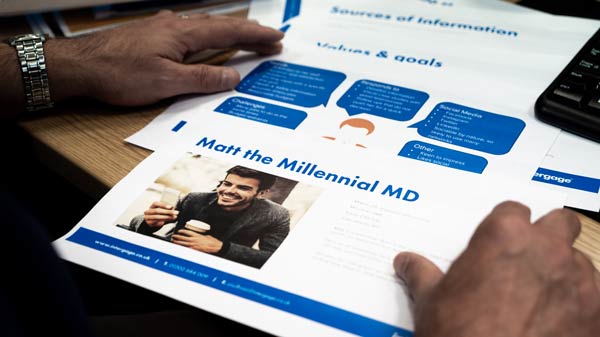Customer Service Killed the Salesman
Only 1% of cold calls lead to booked meetings [1].
Are you surprised?
… probably not. Just ask yourself how you reacted to your last PPI voicemail.
With such damning statistics floating around the sales office, can we declare the role of the salesman officially dead? And if so, who pulled the trigger?
Of course, sales is a complicated niche. To bundle all sales professionals into a bucket of hapless lucky-dip diallers is, to be frank, pretty insulting – but we can’t ignore the facts.
Traditional sales often relied on prospecting. You surveyed your landscape, then you went in for the kill. Armed with little more than a prospect’s name, profession and location, you needed blind faith in your product knowledge – and more than a touch of self-confidence.
Whether you had the gift of the gab or otherwise, traditional sales was a tough gig – or at least, it was if you wanted to be good at it. With this in mind, it was only so long until we started working smarter, not harder.
Salespeople now get involved in the buyer’s journey at a far later stage.
This is beneficial to the salesperson and prospect alike.
After all, businesses are more customer-driven than ever before. Inbound marketing techniques, such as curating valuable content to naturally drive awareness, are carefully sculpted to ensure that a lead is already expressing some interest before they ever engage with a salesperson. Moreover, the sales pitch is likely to hit at the consideration or decision stage, when the buyer has already surveyed the majority of their options.
The result? The buyer isn’t put off by unwanted contact, and the salesperson isn’t wasting energy on somebody who was never all that interested in the first place. Given that this sounds like a coveted win/win, why would this result in the salesperson being DOA? Surely this results in more sales, if you’re actually nailing your inbound marketing strategy?
Sure, an upsurge in conversions is certainly what you’d expect and, in most cases, what you’re likely to get. But where does the traditional, cold-calling salesperson sit in that strategy?
Absolutely nowhere. That guy is dead and buried.
What we need is a new breed of salesperson, to fit your new breed of customer.
Salespeople need to think like marketers, and marketers like customer service. They’re all interlinked but must adopt more and more of their colleagues’ mindset.
Buyers are far too savvy to need a salesperson to tell them what to buy – especially in the awareness and consideration stages. That’s why we have Google.
Unless you are exceptionally cash rich and time poor, you’re unlikely to stroll into a high street mobile phone retailer and let the salesperson tell you which £500 handset to buy, without even a glance at the market online first.
After all, why would you take their word for it? You’ve got a whole world of online impartial advice to absorb. Even if the salesperson has no real agenda, a customer will most likely assume they do – traditionally, salespeople do not get the kindest press.
However, if you’re torn between models, or are ready to negotiate the price and terms, the salesperson can come into their own.
Owning the customer experience is how a modern salesperson can adapt their role to suit the evolving consumer landscape.
At the decision stage, a successful salesperson can secure a positive experience which breeds an excellent relationship with their brand; delivering the value, empathy and assistance that will drive advocacy and evangelism.
Ultimately, the customer has become their own salesperson; and we can’t really claw that back. The instant availability of free reviews, forums and digital content leaves the customer able to consume information on their own terms – as well as ignoring information that they find less appealing. Attempting to shout over the top of it is not only going to be fruitless, but foolish – not to mention perpetuating a fairly arrogant stereotype.
Customers are more educated than ever before. Play them for fools at your peril (and the high price of your Google reviews average score).
Customer service has certainly outlived the old sales mindset, but didn’t kill it, per se – we can pin that on the digital age. A fresh attitude towards sales will ensure that your own salespeople survive the analogue apocalypse.
Just because cold calling is dead doesn’t mean that your salespeople are also lying in the chiller. Sales has evolved and you can embrace it.
Consultative selling, where representatives sell complex products in complex buying environments, is alive and well – because there are some subjects that are simply too large to negotiate without the hand of an expert; or too expensive and mission-critical to simply trust anonymous advice.
Again, this relies on a healthy dose of knowing your audience. A good inbound marketing strategy will ensure that your prospect is both problem and product-aware, and thus ready to get down to business. In turn, you need to know that customer’s pain points inside out, so you can deliver the best possible solution. Again, a quality customer experience will win out.
Marketing automation can make this job a whole lot easier, by allowing the prospect to be nurtured into a hot lead without intrusion.
A prime example would be a website chat bot.
These can be enlisted to chat with visitors in the early stages of their research – endearing them to your brand with quick and always-available customer care, without having to employ an army of humans to deliver the service in real time.
Rather, a channel is provided whereby the prospect can engage with your offering, before introducing a physical salesperson when the time is right – maximising the chance of that conversation turning into a sale.
Marketing automation, as a strategy, can be made increasingly complex – building multi-routed buyer journeys which leverage all available data to deliver the most helpful content, at exactly the right time.
From selecting the most attractive email subject line, to sending that email at precisely the right moment, marketing automation works to provide the quality leads that your salespeople can maximise, with unrivalled customer knowledge and empathy.
Customer service might have killed the traditional salesperson, but the smart salesperson has already evolved. To discover more about marketing automation, download our e-book.
[1] https://www.baylor.edu/content/services/document.php/183060.pdf




.png)

.png)